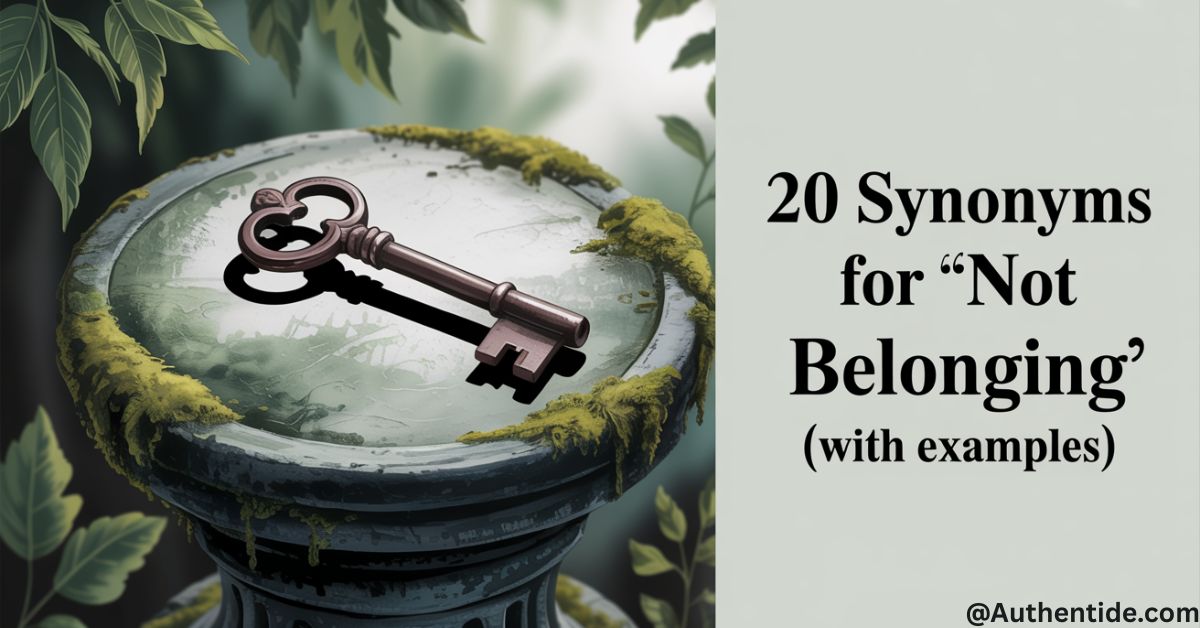Not belonging is a feeling that touches us all at different points in our lives. That gut-wrenching sensation when you walk into a room and immediately know you’re the odd one out. The quiet ache of watching conversations flow around you like water around a stone. The subtle but unmistakable feeling of being separate from others, even in a crowded space.
In today’s increasingly complex social dynamics, these feelings of disconnection have become more prevalent than ever. With remote work, digital relationships, and fragmented communities becoming the norm, many people find themselves searching for the right words to express their sense of detachment. Whether you’re writing a heartfelt email, crafting a poignant story, or simply trying to articulate your emotions during therapy, having precise language to describe this universal human experience can be surprisingly powerful.
This comprehensive guide explores twenty distinct synonyms for not belonging, each with its own subtle shade of meaning and emotional resonance. We’ll dive into practical examples that showcase how these terms apply in real-world situations from professional settings to personal relationships giving you the vocabulary to express these complex feelings with greater clarity and nuance.
Disconnected

Emotional disconnection tops our list as perhaps the most commonly used alternative to express not belonging. To feel disconnected is to experience a sense of being unplugged from others, as if an invisible cord linking you to the people around you has been severed.
This term perfectly captures the mental separation that occurs when you’re physically present but emotionally absent. It suggests a state where meaningful engagement feels impossible despite proximity to others.
Example in a journal entry: March 15th – Attended the department mixer today. Despite being surrounded by colleagues I’ve worked with for three years, I felt completely disconnected from the conversation. While they laughed about shared experiences and inside jokes, I smiled politely, aware of the invisible barrier between us. This feeling of disconnection has been growing lately, making me wonder if I should be looking for a team where I might naturally fit in better.
Outcast
An outcast represents someone who has been deliberately rejected from a social group or community. This powerful term carries connotations of societal rejection and implies active exclusion rather than mere passive distance.
The word evokes historical practices of banishment and speaks to the pain of being explicitly unwanted or pushed away from a community you once belonged to or wished to join.
Example in a text message: Hey Sam, I need your advice. After speaking up about the ethical concerns in the marketing campaign, I’ve become something of an outcast in the creative department. People lower their voices when I approach, and I’ve stopped receiving invites to brainstorming sessions. Should I address it directly or start looking elsewhere? This ostracism is affecting my work.
Alienated
To feel alienated is to experience a profound sense of estrangement from others, institutions, or even aspects of yourself. This term, rooted in social theory, captures the cultural disconnection that occurs when someone feels foreign to their surroundings despite technically being part of them.
Alienation suggests a deeper philosophical and psychological detachment, often from something you were once connected to or should naturally feel affinity with.
Example in a therapy session: “I’ve been feeling increasingly alienated from my family since I changed careers. My parents built their identities around academic achievement, and my choice to leave academia for entrepreneurship has created this weird tension. Every dinner conversation somehow circles back to what my cousins are publishing or which university my sister is lecturing at. My work and passions might as well be from another planet. This identity crisis is exhausting I’m still the same person, but they can’t seem to relate to who I’ve become.”
Unrelated
When something or someone is unrelated, they exist without meaningful connection or relevance to others in a particular context. This term emphasizes lack of belonging through absence of connection rather than through active rejection.
It can describe both people and things that don’t share a logical or natural association with a group, idea, or situation.
Example in a work email: *To: j.martinez@innovatech.com
Subject: Concerns about project allocation
Dear Jaime,
I wanted to discuss my current assignment on the Thompson account. As someone with a background in healthcare marketing, I feel decidedly unrelated to the automotive industry projects I’ve been assigned. My skills and insights feel largely unused, and I believe both the team and our clients would benefit from having someone with relevant industry experience in this role.
Could we discuss realigning my project assignments to areas where my expertise would add more value?
Best regards, Alex*
Estranged
Estranged describes a state of being emotionally distant from someone or something with which you once shared a close bond. It most commonly applies to familial estrangement or other intimate relationships that have grown cold.
This term carries a sense of loss and history, implying a relationship that deteriorated over time rather than one that never existed.
Example in a holiday card: *Dear Uncle Robert,
Though we’ve been estranged these past few years following the family business disagreement, the holiday season has me reflecting on happier times. Our family breakdown has left a gap in my life that I increasingly feel as I get older. If you’re open to it, perhaps we could start with a simple coffee sometime in the new year no pressure, no expectations.
Wishing you well regardless, Nephew Marcus*
Find more words!
Beyond the common terms, there exist many nuanced expressions for not belonging that capture specific aspects of this complex emotional experience. These additional synonyms provide greater precision when describing different forms of personal isolation and disconnection:
Unattached

To be unattached is to exist without bonds or connections that secure you to others. Unlike some harsher terms, this word can have neutral or even positive connotations, suggesting independence and freedom from constraint.
In interpersonal relationships, being unattached means having the absence of ties that might otherwise provide both support and obligation.
Example in a dating profile: “Professionally established artist, happily unattached and looking for meaningful connection without rushing into labels. I value my independence and creative solitude but am open to finding someone who understands the beauty of two whole lives intersecting rather than merging. My years of emotional withdrawal taught me that true connection doesn’t require losing yourself quite the opposite.”
Excluded
When you’re excluded, you’ve been deliberately left out or kept apart from others. This term emphasizes the action taken by others to prevent your participation or involvement, making it particularly appropriate for describing instances of active social exclusion.
The word carries strong emotional weight, pointing to experiences of rejection that can be especially painful.
Example in a complaint letter: *To: Principal Washington
Subject: Concerns about classroom dynamics
Dear Principal Washington,
I’m writing regarding my daughter Zoe’s experiences in Ms. Peterson’s 8th grade class. Zoe has repeatedly come home upset, feeling excluded from group activities. Despite her attempts to participate, she reports that teams form quickly, leaving her without partners. This marginalization is affecting both her academic performance and her emotional well-being.
I understand children naturally form friendship groups, but I’m concerned about the apparent lack of teacher intervention in these situations of ostracism. Could we schedule a meeting to discuss strategies for promoting a more inclusive classroom environment?
Sincerely, Denise Morris*
Isolated
Isolation describes a state of being separated from others, often with limited or no contact. Unlike similar terms, isolation can be physical, social, or psychological, making it a versatile descriptor for various experiences of emotional detachment.
The term suggests a comprehensive separation that may be imposed externally or self-created as a protective mechanism.
Example in a journal entry: February 8th – Working remotely seemed like a dream six months ago, but now I feel completely isolated from my colleagues. Video calls and messaging apps can’t replace the spontaneous conversations and sense of camaraderie I used to take for granted. This psychological isolation is affecting my creativity I miss bouncing ideas off others and the energy of collaborative problem-solving. Need to find ways to rebuild those connections before this feeling of being alone in my work deepens further.
Segregated
To be segregated means to be formally separated from others, often based on specific characteristics or categories. This term has strong historical associations with discriminatory practices and systems of societal rejection based on race, religion, or other identities.
Its use implies that the separation is systematic, intentional, and enforced rather than simply emerging organically.
Example in a community forum post: “Our neighborhood has become increasingly segregated along economic lines since the new development went in. Residents of the apartments rarely mix with homeowners, and community events seem to cater exclusively to the wealthier households. This discrimination isn’t explicit no one is posting ‘no renters allowed’ signs but the effect is the same. We need to discuss how our community association can actively counter this trend of segregation before it becomes further entrenched.”
Dissociated
Dissociated describes a psychological state of detachment from one’s surroundings, thoughts, or identity. While often used in clinical contexts, it can effectively describe profound experiences of not fitting in within social environments.
This term captures the disorienting sensation of being present physically while feeling fundamentally disconnected from your environment or even yourself.
Example in a therapy session: “During the family reunion, I found myself becoming increasingly dissociated as the day went on. While everyone reminisced about shared childhood memories, I smiled and nodded, but felt like I was watching the scene through glass. My identity loss in these situations is strange I know intellectually these are my relatives, but emotionally, I feel no connection to their shared history or inside jokes. It’s as if ‘belonging’ is a language everyone else speaks fluently while I’m still struggling with the basic vocabulary.”
Unaffiliated

Someone who is unaffiliated lacks formal association or official connection with a group, organization, or cause. This term has a neutral, matter-of-fact quality that makes it useful in professional settings where emotional language might be inappropriate.
It emphasizes the absence of recognized ties rather than subjective feelings about that absence.
Example in a networking introduction: “Hi, I’m Taylor Chen. I’m currently unaffiliated with any specific company I left Deloitte three months ago to explore independent consulting opportunities. My background is in sustainability analytics, but I’m attending industry events across several sectors while I consider where my skills might add the most value. Being professionally disengaged from a single employer has been both challenging and refreshing I miss the team environment but appreciate the freedom to consider multiple paths forward.”
Disengaged
To be disengaged is to be disconnected from activity or involvement, suggesting a withdrawal of attention, interest, or participation. This term is frequently used in workplace contexts to describe professional disengagement and job dissatisfaction.
It implies a previous state of engagement that has diminished over time, resulting in reduced investment in outcomes.
Example in a performance review: “Over the past quarter, Raj has appeared increasingly disengaged during team meetings and collaborative projects. His technical work remains competent, but his previous enthusiasm for mentoring junior staff and contributing to brainstorming sessions has noticeably decreased. This workplace detachment seems to coincide with the reorganization that moved his role under new management. I recommend a one-on-one discussion to understand his perspective and identify any addressments that might help reconnect him with the team’s mission and restore his previous level of involvement.”
Separate
Something separate exists apart from others, maintaining clear boundaries and distinction. This straightforward term emphasizes physical or conceptual distance without necessarily implying emotional judgment about that distance.
It can describe a neutral or even intentional state of independence rather than an unwanted exclusion.
Example in a letter to a friend: *Dear Eliza,
Life in the new city has been an adjustment. I’ve been keeping separate from the established social circles at work, taking time to observe the dynamics before diving in. This isn’t the loneliness I expected—more a deliberate space I’m maintaining while I find my footing. After years of defining myself through others’ perceptions, there’s something valuable in this temporary detachment.
That said, I’ve found a small writing group that meets Thursdays. The conversations there feel different—more authentic. Maybe because we’re all creating separate worlds on paper, there’s less pressure to conform in the room.
How are things in your world? Taylor*
Apart
Being apart means existing in a state of separation or distance from others. This versatile term can describe physical, emotional, or conceptual separation and works well to express feelings of personal isolation without excessive drama.
Its simplicity makes it useful in many contexts, from casual conversation to more serious discussions of belonging.
Example in a social media post: “Six months into this international assignment, and still feeling apart from the local team despite their surface-level friendliness. Cultural disconnection runs deeper than language barriers—it’s the unspoken assumptions, the references I miss, the jokes that fall flat. For anyone considering an expat position, prepare for this sense of being alone even in a crowd. Finding even one person who bridges both worlds makes all the difference. #ExpatLife #CulturalAdjustment”
Disowned
Someone who is disowned has been explicitly rejected or cut off by their family or another group that previously claimed them. This powerful term describes a formal severance of ties and recognition, often with significant social and sometimes legal implications.
It represents one of the more severe forms of not belonging, where previous connections have been actively and publicly severed.
Example in a support group introduction: “Hi, I’m Adrian. I was disowned by my family three years ago after changing religious beliefs. This family breakdown wasn’t a single explosive event more a series of increasingly difficult conversations that ended with my parents telling me I was no longer welcome in their home unless I ‘returned to the faith.’ The emotional cut-off was total—they blocked my number, returned letters unopened, and told extended family not to contact me. I’m here because I’m finally ready to talk about rebuilding a life when your foundation of belonging has been completely removed.”
Disenfranchised
To be disenfranchised means to be deprived of power, opportunity, or rights enjoyed by others. This term has strong political connotations but applies broadly to any situation where one lacks the agency or privilege afforded to most members of a group.
It speaks directly to social dynamics where systematic exclusion creates profound barriers to belonging.
Example in a community organizing email: *To: neighborhood@listserv.org
Subject: Transportation Planning Meeting – Your Voice Matters
Dear Neighbors,
As many of you know, the city’s transportation planning committee has historically made decisions that left our district feeling disenfranchised from the broader urban development process. The planned highway expansion would further marginalize our community, physically dividing us from downtown resources and increasing environmental burdens on our residents.
This Thursday’s public hearing represents a critical opportunity to ensure our concerns about these societal rejection patterns are formally recorded. I urge everyone who can attend to join us at City Hall at 7 PM particularly those from the eastern blocks who would be most directly affected by the proposed changes.
In community, Chairperson Jordan Williams*
Marginalized

Marginalized individuals or groups exist at the periphery of society, excluded from mainstream acceptance or power. This term acknowledges systematic patterns of discrimination that push certain people to society’s edges based on aspects of their identity.
It emphasizes the structural nature of exclusion rather than personal feelings or individual actions.
Example in a diversity and inclusion workshop: “In today’s exercise, we’ll be examining how marginalized voices are often unintentionally silenced in meeting environments. Research shows that women, people of color, and team members from non-dominant cultural backgrounds frequently experience their contributions being overlooked, interrupted, or attributed to others. These patterns of social exclusion happen even in teams with the best intentions, creating disconnected individuals who gradually withdraw from participation. Let’s discuss specific communication strategies that ensure everyone has meaningful access to the conversation.”
Peripheral
Someone who is peripheral exists at the edges or boundaries rather than at the center. This descriptive term applies well to social situations where one is technically present but not central to activities or decision-making.
The word carries less emotional weight than some alternatives, making it useful for describing more subtle experiences of not fitting in.
Example in a memoir excerpt: “Throughout high school, I occupied a peripheral position in the social ecosystem—not exactly excluded, but never fully embraced either. I drifted between groups, welcomed briefly before inevitably floating away, recognized but rarely remembered. This feeling left out status granted me a unique vantage point; I became an observer of teenage social dynamics, noticing patterns and hierarchies invisible to those embedded within them. Years later, this same capacity for seeing from the margins would become my greatest strength as a cultural anthropologist, though at sixteen, it felt only like an unnameable loneliness.”
Exiled
An exiled person has been forced or prohibited from returning to their place of origin or belonging. This term has historical weight, traditionally referring to political banishment but applicable to many forms of forced separation.
It implies both physical distance and an preventing force that keeps one from returning.
Example in a creative writing piece: “Elena lived as one exiled from her former community—not by legal decree or physical barriers, but by the subtle workings of memory and change. Each visit to her hometown shrank the space she once occupied there; childhood haunts renovated beyond recognition, old friends transformed by time into polite strangers with whom she shared only ghosts of connection. Her assimilation issues in the city where she now lived only heightened this sense of floating between worlds, belonging fully to neither. She was a perpetual visitor everywhere, carrying her true home like a folded map in her pocket, a place that existed now only in the geography of remembrance.”
Outsider
An outsider is someone who does not belong to a particular group or community, viewing it from an external perspective. This common term effectively captures the experience of being separate from a defined circle without the more specific implications of rejection or alienation.
It acknowledges a clear boundary between those who belong and those who don’t, without necessarily assigning blame for that separation.
Example in a job application cover letter: “My perspective as an outsider to the pharmaceutical industry might initially seem like a limitation, but I believe it represents my greatest potential contribution to your marketing team. While deeply versed in consumer psychology and brand development, I bring fresh eyes unencumbered by sector conventions or assumptions. This lack of involvement in established industry thinking has allowed me to develop innovative approaches that have proven successful in similarly regulated environments like financial services and healthcare technology.”
Misfit

A misfit is someone whose characteristics, values, or behaviors don’t align with their environment, causing them to stand out or struggle to integrate. This colorful term acknowledges both the environment and the individual’s contribution to the lack of harmony between them.
It can carry negative connotations but has also been reclaimed as a positive identity by many who value their divergence from norms.
Example in a college application essay: “I’ve always been something of a misfit in my small rural community the kid with too many questions in Sunday school, too many books on subjects nobody around me discussed, and too much restless curiosity about worlds beyond our county lines. This social misfit status was painful in middle school but became a source of quiet pride by high school. I learned to value my different perspective, to see how my identity crisis actually reflected authentic engagement with ideas my peers hadn’t yet encountered. The university environment I seek isn’t one where I’ll finally ‘fit in,’ but rather one where being intellectually distinctive is the norm—a community of misfits united by our love of learning.”
Frequently Asked Question
What is a word for not belonging?
Not belonging can be described as disconnection. This powerful word captures that feeling of being separate from others even when physically present. Other effective terms include alienated, outcast, isolated, and estranged each conveying slightly different shades of that painful experience when you just don’t fit in. The term you choose really depends on whether you’re describing an active rejection (like “excluded”) or a more passive sense of separation (like “unaffiliated”).
What is the synonym of the feeling of not belonging?
The synonym of the feeling of not belonging is alienation. This powerful word captures that gut-wrenching sensation of being emotionally cut off from others. Other effective terms include disconnected, isolated, estranged, and outcast each highlighting different aspects of feeling like an outsider. If you’re describing a more subtle experience, words like peripheral or unaffiliated might better capture that sense of existing on the margins without complete rejection. The exact term depends on whether you’re feeling actively pushed away or simply lacking natural connection to those around you.
What’s a word for someone who doesn’t belong?
An outsider is the perfect word for someone who doesn’t belong. This term captures that sense of standing beyond the circle, looking in. You might also call them a misfit if they clash with their environment, an outcast if they’ve been actively rejected, or a peripheral figure if they exist at the edges of a group without full inclusion. For someone completely disconnected from their surroundings, alienated hits the mark. Each term carries its own emotional weight from the relatively neutral “unaffiliated” to the more painful “exiled” – depending on exactly how and why they don’t fit in.
Conclusion
The richness of language surrounding the concept of not belonging reflects how fundamental this experience is to human existence. From the mild feeling of being unrelated to the severe rejection implied by being disowned, these twenty synonyms offer nuanced ways to express the varied experiences of disconnection we encounter throughout our lives.
Understanding these distinctions matters for our mental well-being. By precisely naming our experiences, we gain greater clarity about our social positions and emotional responses to them. Sometimes, recognizing that we feel peripheral rather than alienated can help us approach a situation with more appropriate strategies and realistic expectations.

Your go-to place for smart synonyms and celebrity updates. Muhammad Hassan Abid is dedicated to creating useful, engaging content that informs, inspires, and truly serves your curiosity

